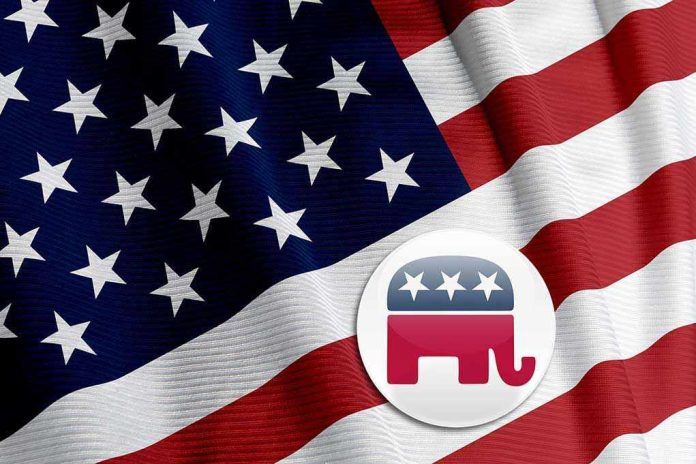
Just days before voters decide Virginia’s next governor, a campaign bus carrying the most historic Republican in the race erupts in flames—forcing everyone to ask: will this fiery disruption tip the scales, or will it fuel an unexpected surge?
Story Snapshot
- Winsome Earle-Sears’ campaign bus caught fire days before the Virginia gubernatorial election, disrupting the final campaign push.
- No injuries were reported, but logistics and voter sentiment were immediately affected as staff scrambled to adapt.
- The incident drew heightened media attention, raising questions about safety, crisis management, and election impact.
- Earle-Sears’ response showcased leadership under pressure and highlighted her historic candidacy.
Flames on the Campaign Trail: Timing That Could Change Everything
Winsome Earle-Sears, the Republican candidate and Virginia’s incumbent Lieutenant Governor, was deep into an aggressive statewide tour when her campaign bus suddenly became the story. Late October 2025—a mere heartbeat before Election Day—her campaign vehicle burst into flames. Emergency responders arrived within minutes, evacuating staff and swiftly controlling the blaze. The timing could not have been more critical, as every campaign event in those final days carries outsized weight. In a race already marked by fierce competition and historic stakes, the fire was more than a logistical headache; it was a high-voltage test of resilience, leadership, and public perception.
As news of the fire ricocheted across media channels, speculation erupted regarding its cause and consequences. Some observers wondered whether sabotage or negligence was to blame, though official statements made clear that no evidence of foul play had emerged and the incident remained under investigation. The spectacle of a burning campaign bus—especially for a candidate who has broken barriers as the first Black woman and first female veteran elected statewide in Virginia—was bound to ignite public curiosity and concern. The disruption forced Earle-Sears’ campaign to immediately recalibrate, cancelling or relocating events, and finding alternative transportation to maintain momentum.
Historic Candidate Faces a New Kind of Test
Earle-Sears’ candidacy is itself a story of firsts. Her journey from Jamaican immigrant to Marine Corps veteran to statewide officeholder represents a living portrait of American possibility. Her tenure as Lieutenant Governor, marked by outspoken advocacy for education reform, criminal justice improvement, and veteran affairs, set the stage for a gubernatorial run that captured national attention. The bus fire, arriving at such a pivotal moment, raised questions not just about logistics but about her leadership in crisis. Would she be able to rally her team and supporters, project strength, and keep the campaign on track under pressure?
Responding swiftly, Earle-Sears expressed gratitude to emergency responders and reassured the public that safety was her top priority. Her campaign’s rapid adjustment—shifting schedules, deploying backup vehicles, and leveraging digital outreach—demonstrated operational competence and adaptability. For voters and political analysts, the episode became a litmus test: could Earle-Sears turn adversity into advantage, or would disruption dampen her chances?
The Ripple Effects: Safety, Sympathy, and Election-Day Uncertainty
Campaign vehicle incidents are rare, but history shows their impact can be outsized in high-profile races. The immediate effect was logistical: lost time, canceled events, and the scramble for alternative transportation. Yet the deeper impact was psychological and political. Supporters rallied, expressing sympathy and admiration for Earle-Sears’ resilience. Opponents questioned preparedness, hinting at possible lapses in safety protocols. Media coverage intensified, dissecting every statement and speculating on how the incident might shift voter sentiment.
Earle-Sears' campaign bus bursts into flames days before election for Virginia governor https://t.co/MacbTlElRY
— ConservativeLibrarian (@ConserLibrarian) October 30, 2025
For undecided voters, the bus fire introduced new variables into an already complex decision. Would the image of a candidate overcoming adversity solidify support among those who value grit and crisis management? Or would doubts about campaign safety sow hesitation? Analysts debated whether sympathy would translate into votes, or whether logistical setbacks would blunt late-stage outreach. The campaign’s ability to adapt became an emblem of its broader capacity to govern—a narrative that resonated with voters looking for evidence of steady leadership.
Crisis Management as a Defining Moment
Political experts agree: how a candidate handles unexpected crises can shape not only the trajectory of a campaign but the perception of fitness for office. Earle-Sears’ response aligned with conservative values of personal responsibility, gratitude for first responders, and operational discipline. Her campaign’s transparency and proactive communication reassured supporters and kept the story from spiraling out of control. While some speculation about sabotage surfaced, official investigations found no basis for such claims, focusing instead on mechanical malfunction or accidental causes.
The bus fire’s legacy may linger beyond Election Day. Campaigns across the country are likely to re-examine safety protocols and crisis response plans, inspired by the high-stakes lesson from Virginia. For Earle-Sears, the incident has become a chapter in her larger story—a test of mettle that may ultimately reinforce her appeal or expose vulnerabilities, depending on how voters interpret events in the final hours before the polls open.
Sources:
About the Lieutenant Governor | Commonwealth of Virginia
Winsome Earle-Sears | Virginia Changemakers
Winsome For Governor | Learn More



